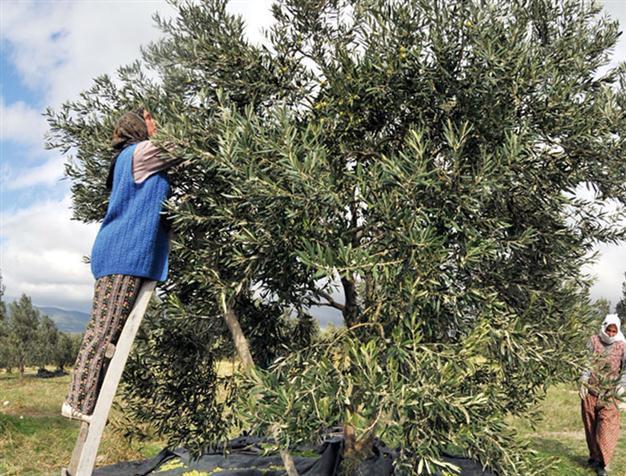Turkey may face hunger without aid in agriculture
ANKARA - Hürriyet Daily News

Farmers are picking olives in a grove in the Aegean province of Manisa in this undated photo. There are over 2.5 million unregistered farmers who do not receive any government support, according to Şemsi Bayraktar. DAILY NEWS photo, Emrah GÜREL
If the productivity of the agriculture sector falls, Turkey will face risk of hunger in the long run, said The Union of Turkish Chambers of Agriculture (TZOB) head Şemsi Bayraktar as he disclosed the chamber’s 2011 agricultural overview report.Speaking at a meeting in Ankara yesterday, he said from January to September 2011, the agricultural sector grew by 5.3 percent but the sector, and farmers in particular, still needed government support; only with this support would Turkey’s agricultural sector be able to prop up Turkey’s economy.
Bayraktar said despite the fact 2.8 million farmers are registered, there are over 2.5 million farmers who are still not officially registered in Turkey and therefore do not receive any form of government support. “This sector provides a huge source of employment and, therefore, there needs more focused and systematic support,” said Bayraktar.
Costs hurt farmers
With the rise in fertilizer and diesel fuel prices, Turkish farmers are being badly hit, explained Bayraktar. The cost of production for Turkish farmers was prohibitively high and they were struggling to compete with their foreign counterparts, he added. There has been a decrease in agricultural crops dependent on fertilizer and diesel fuel this year.
“Despite all these obstacles, Turkish farmers were still able to feed Turkey’s 74 million population, 30 million tourists and recorded an $18 billion export record in 2011,” said Bayraktar.
Turkey has the capacity
Bayraktar projected by the 100th anniversary of the Turkish republic in 2023, Turkey’s agricultural sector would be able to feed a domestic population of 85 million, 50 million tourists and would exceed $30 million in export revenues.
“Turkey has the capacity for this level of agricultural production, but our famers must receive the necessary support and the government must apply intelligent policies to this end,” said Bayraktar.
From December 2010 to December 2011, agricultural crops to have seen the sharpest rise in their retail prices have been eggplants, with over a 100 percent price increase, followed by cucumbers, tangerines and peppers from Turkey’s Silivri region. Conversely, the biggest drop in retail prices has been in onions, pears, potatoes, and leaks, according to the report. Bayraktar believes, as a whole, both producers and consumers are being negatively impacted by the two to three-fold rise in prices.
















